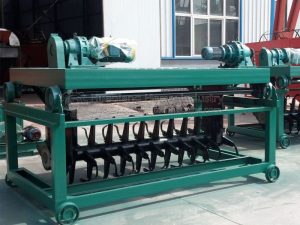In organic fertilizer production, despite its seemingly simple structure, the simple compost turner, with its flexible and efficient features, serves as a key link between raw materials and finished products. It also seamlessly integrates with other equipment to support the complete organic fertilizer production chain. For small and medium-sized fertilizer plants, it not only lowers the production barrier but also enables efficient fertilizer production.

During the raw material pre-treatment stage, the crusher takes the lead in “pulverizing” raw materials such as straw and livestock manure into small segments of 3-5 cm to prepare for subsequent fermentation. If the moisture content of the raw materials is too high, the horizontal mixer will also accurately add dry sawdust or rice husks to adjust the moisture to about 60% – this is the “golden humidity” with the highest microbial activity. At this time, the simple compost turner comes on the scene. With its adjustable turning teeth, it moves slowly in the fermentation tank, turning the mixed raw materials evenly and allowing air to fully enter the pile. You know, aerobic fermentation cannot be separated from sufficient oxygen. The compost turner operates once every 24 hours and can stabilize the temperature inside the pile at 55-65°C.This temperature kills insect eggs and pathogens while allowing microorganisms to efficiently decompose organic matter, shortening the fermentation cycle by nearly half compared to manual turning.
After fermentation is complete, a drum screener machine takes over, separating the fermented material into coarse and fine fractions using multiple screens. The coarse fraction returns to the crusher for secondary processing, while the fine fraction enters the granulator, where it is made into organic fertilizer granules with a diameter of 3-5 mm. Finally, a dryer reduces the moisture content of the granules to below 12%, ensuring that the product does not clump or deteriorate during storage and transportation.
After introducing this equipment, a small organic fertilizer plant in Africa saw its monthly output increase from 50 tons to 150 tons. The stable product quality has earned it widespread acclaim among local farmers. The perfect combination of the simple compost turning machine and other equipment not only reduces the cost of organic fertilizer production but also allows the concept of green agriculture to take root in more regions.


